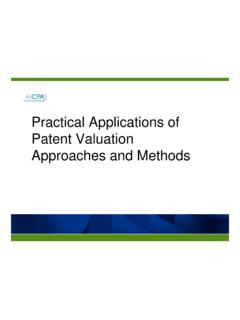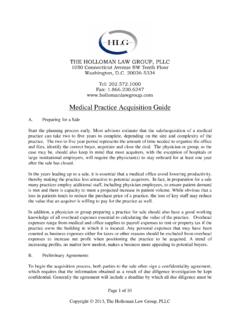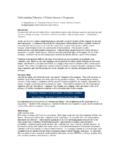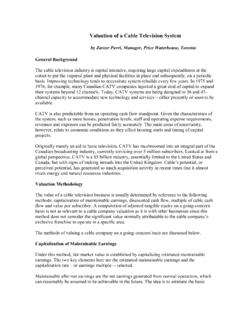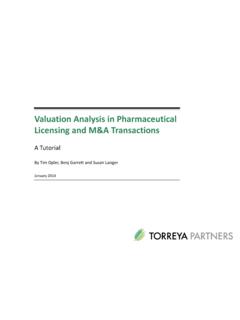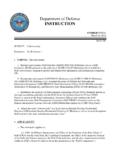Transcription of Compulsory Acquisition and Compensation in …
1 Compulsory Acquisition and Compensation in ghana : principles and practice / Dr. Wilfred K. Anim-Odame Page 1 Compulsory Acquisition and Compensation in ghana : principles & Practice Dr Wilfred K. Anim-Odame, FGhIS1 Paper presented at the American Real Estate Society Conference in Seattle-Washington, USA from 13 -16 April 2011 Abstract: The greatest challenge confronting the Government of ghana in the use of its powers of Compulsory Acquisition to expropriate private interest in real estate is the ability to pay fair and adequate Compensation promptly. Meanwhile, the operative Constitution in the country reinforces commensurate Compensation payment based on the principle of equivalent reinstatement. This paper uses data from an American sponsored infrastructural development project under a compact for the Millennium Development Authority in ghana to provide a succinct overview of Compulsory Acquisition and Compensation payment.
2 It further analyses valuation-based data to demonstrate emerging Compensation issues. Using data on 2,632 real estate assets compulsorily acquired for the project, results show that the valuation profession and real estate market are gradually developing in ghana . The results strongly suggest values obtained by government valuers for acquiring body and those by private sector valuers for expropriated asset owners are highly correlated. This paper provides significant indicators to guide policy formulation for valuation practices for Compulsory Acquisition and Compensation in the country. It concludes that Compensation determination requires sufficient valuation skills and the use of appropriate techniques to yield fair and adequate Compensation . Prompt payment, however, depends on the availability of funds. Introduction The use of powers of Compulsory Acquisition by the Government of ghana to expropriate private interest in real estate is challenged by its ability to pay fair and adequate Compensation promptly.
3 This paper aims to highlight Compensation principles as applied in ghana . It also provides empirical evidence on Compensation determination from both public and private sector valuers on a specific Compulsory Acquisition of 2,632 wide-ranging properties. Compulsory Acquisition of landed asset by Government or its Ministries, Departments and Agencies (MDAs) in the public interest is, as expected, subject to the payment of fair, adequate and prompt Compensation . This principle is now well-known among the people of ghana . In general, apart from land, buildings and other structures of all types as well as crops food and cash may be adversely affected by Compulsory Acquisition to warrant Compensation payment. Compensation payment arises when an interest (legal or customary) in a landed asset is extinguished as a result of a Compulsory Acquisition .
4 Recently, monetary payment for the loss of livelihood has been equated to Compensation to occupants of real estate assets, who may not necessarily own an interest therein. In practice, Compensation estimation includes elements of disturbance; its quantum is indeed related to the use, type and location of the real estate expropriated. For commercial assets such as shops and fuel stations, Compensation assessment may require additional provision for specific element of disturbance to include goodwill. Post-independence acquisitions have primarily relied on the State Lands Act, 1962 (Act 125) and the State Lands (Amendment) 2005, Act 586. Provisions of these two statutes are rather restricted to the Acquisition of private interest in real estate. In contrast, Acquisition of stool2 lands has been accomplished using the Administration of Lands Act, 1962 (Act 123).
5 Under Act 125 and Act 586, a lump sum Compensation is payable to claimants. Section 10 of Act 123 on the other hand prescribes the 1 Director, Land Valuation Division, Lands Commission, ACCRA ghana 2 A stool means the seat of a chief of an indigenous group or community which represents the source of authority of the chief. It is a symbol of unity and its responsibilities devolve upon its living representatives, the chief and his councilors (elders). Land owned by such a group or community is referred to as stool land. (National Land Policy, Ministry of Lands and Forestry, 1999). A skin in Northern ghana is the equivalent of a stool in Southern ghana . Compulsory Acquisition and Compensation in ghana : principles and practice / Dr. Wilfred K. Anim-Odame Page 2 payment of annual Compensation rental for stool land Acquisition taking accounts of the degree of social benefit inherent in the Acquisition .
6 Compulsory Acquisition procedures are deemed to be opened and publicized to attract claims from Project Affected Persons (PAPs). Under Act 125, the Acquisition instrument commonly known as the Executive Instrument is published and publicized in a prescribed manner (see Section 2 of Act 125). However, Article 20 of the 1992 Constitution of the Republic of ghana underpins the authority of the State to compulsorily acquire landed property in the public interest subject to prompt payment of fair and adequate Compensation . And any aggrieved person shall have access to the High Court for redress on determining matters of ownership right and quantum of Compensation . An unexplored area of specific interest to the real estate profession, particularly valuers or appraisers, is claimants non-compliance with the basic requirements of a valid claim. Section 4 of Act 125 provides four (4) explicit legal requirements for a valid claim.
7 These are: particulars of claim or interest in land; the manner in which his claim or interest has been affected by the instrument of Acquisition ; the extent of any damage done; and the amount of Compensation claimed and the basis for the calculation of the Compensation . It is not uncommon to find one or more of these requirements not provided; most often, in claims submitted by legal firms on behalf of claimants. In contrast, valuation reports submitted by private sector Valuers on behalf of claimants tend to satisfy these requirements. The time limit for the service of claim is also definite. Valid claims are to be served within six (6) months from the date of publication of the instrument of Acquisition , that is, the Executive Instrument. A claim served on Government or the acquiring body outside the statutory six months period can be considered out-of-time.
8 In such an event, the purported claim may be processed and Compensation only paid as ex-gratia depending on whether it is grossly out-of-time or not. Practically, this may be the same amount as the legal Compensation would have been. Claimants under an out-of-time circumstance may however, forfeit the opportunity to negotiate Compensation amount. The International Finance Corporation of the World Bank has in recent years developed and implemented related policies to regulate payment of Compensation for its sponsored projects, particularly in emerging economies. Its operational policies on involuntary resettlement are of specific mention. The World Bank (2007) argues that involuntary resettlement may cause severe long-term hardship, impoverishment, and environmental damage unless appropriate measures are carefully planned and carried out.
9 For this reason, it permits payment of Compensation in the form of loss of business income to PAPs who may not necessarily have legal or customary interest in the affected real estate asset. Such payments are made to a category of persons where the involuntary taking of land or real estate assets results in relocation or loss of shelter; lost of any kind of asset or access to it; and loss of income sources or means of livelihood. As a principle, displaced persons are to be assisted in their efforts to improve their livelihoods and standards of living at least to restore them, in real terms, to pre-displacement levels or to levels prevailing prior to the beginning of project implementation, whichever is higher. This paper uses data from a Millennium Development Authority (MiDA) sponsored project in ghana , which fits well into the country s legal framework on Compulsory Acquisition and Compensation , and also consistent with the principles under involuntary resettlement.
10 This project is a three-lane dual carriage ways between Tetteh Quarshie Interchange and Mallam Junction in Accra, the capital city of ghana . The kilometre stretch of road due for completion in December, 2011 has displaced 11,000 people, affected over 2,632 permanent and temporary buildings and structures, kilometres of pipelines and electric cables realigned and 11 fuel filling stations relocated. The entire project is funded from a US$ 557 million compact between the governments of USA and ghana through the Millennium Development Authority. Compulsory Acquisition and Compensation in ghana : principles and practice / Dr. Wilfred K. Anim-Odame Page 3 Required expertise to assess Compensation payable to PAPs or expropriated owners is abundantly available in ghana . The principle of equivalent reinstatement in Compensation determination is also well known among valuers and appraisers in the country.


